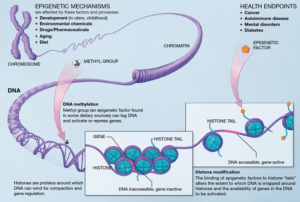Epigenetics in Cancer: A Hematological Perspective

Last Updated on October 11, 2016 by Joseph Gut – thasso

October 11, 2016 – Here, you will find an overview article on applied epigenetics and its role when it comes to cancer. This is heavy material to read and therefore most probably geared toward the science-inclined readers of thasso post and patients in thasso’s patient networks. Nevertheless, this article gives some insights into the role epigenetic may increasingly play in theragenomic and personalized medicine. Enjoy reading. Feedback, at any level, is most welcome.
________________
Stahl M, Kohrman N, Gore SD, Kim TK, Zeidan AM, Prebet T
PLoS Genet. 2016 Oct;12(10):e1006193
PMID: 27723796
Abstract
For several decades, we have known that epigenetic regulation is disrupted in cancer. Recently, an increasing body of data suggests epigenetics might be an intersection of current cancer research trends: next generation sequencing, immunology, metabolomics, and cell aging. The new emphasis on epigenetics is also related to the increasing production of drugs capable of interfering with epigenetic mechanisms and able to trigger clinical responses in even advanced phase patients. In this review, we will use myeloid malignancies as proof of concept examples of how epigenetic mechanisms can trigger or promote oncogenesis. We will also show how epigenetic mechanisms are related to genetic aberrations, and how they affect other systems, like immune response. Finally, we will show how we can try to influence the fate of cancer cells with epigenetic therapy.
See the full article here.






